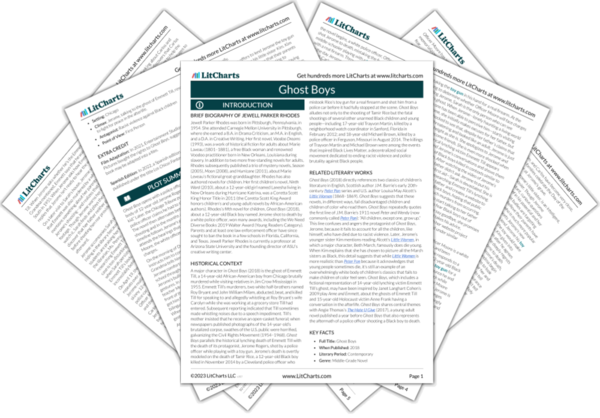Ghost Boys represents childhood as an experience allowed to privileged children but denied to other children, especially boys of color. The novel’s protagonist, a 12-year-old Black boy named Jerome Rogers, is rarely allowed to play outside because his parents fear the drive-by shootings that plague their impoverished, segregated Chicago neighborhood. When a new boy at Jerome’s school, Carlos Rodríquez, offers to lend Jerome a toy gun as a kind of friendship gift, Jerome takes the toy even though he knows his Ma and Pop wouldn’t like it. This minor, entirely ordinary childhood rebellion leads to a white policeman, Officer Moore, shooting Jerome to death after misperceiving him as an adult with a real gun. That Officer Moore sees short, 12-year-old Jerome as an adult—and kills Jerome because Jerome acted like a carefree child for once—shows how a racist culture refuses to see Black children as children and often cuts their childhoods short as a result. After Jerome’s death, Carlos is wracked with guilt: his overwhelming remorse leads him to take on the quasi-adult responsibilities Jerome formerly shouldered for his younger sister Kim. Though Carlos is not morally responsible for Jerome’s death—he lent his friend a toy, nothing more—his traumatized guilt steals some of his childhood innocence too.
By contrast, Officer Moore’s white daughter Sarah lives a peaceful existence in a safe neighborhood. As the novel progresses, she does learn about the history of racist murders of Black boys, but she is the one seeking out disturbing truths: she gives up childishness, but her childhood isn’t stolen from her as it is stolen from Jerome and Carlos. Sarah’s relatively sheltered existence shows how white, middle-class children are often given an opportunity to be children in a way that poor children of color often are not.
Childhood ThemeTracker

Childhood Quotes in Ghost Boys
I’m dead.
I thought I was bigger. Tough. But I’m just a bit of nothing.
My arms are outstretched like I was trying to fly like Superman.

Unlock explanations and citation info for this and every other Ghost Boys quote.
Plus so much more...
Get LitCharts A+I’m pudgy, easily teased. But when I’m a grown-up, everybody’s going to be my friend. I might even be president. Like Obama.
Ma always says, “In this neighborhood, getting a child to adulthood is perilous.”
I looked up the word. Perilous. “Risky, dangerous.”
“Emmett. Just like Emmett Till,” says Grandma. “He was a Chicago boy, too.”
“This isn’t 1955,” says Reverend, calming.
“Tamir Rice, then,” shouts Pop. “2014. He died in Cleveland. Another boy shot just because he’s black.”
“You’re nothing in Chicago. Say it.” Snap twists Carlos’s arm. “Say it, ‘I’m nothing.’”
“Black lives matter!” someone hollers.
I’m always good. (Teasing Kim doesn’t count.) I say what Grandma wants to hear. Calm her and Ma. Watch out for Kim. Play Minecraft for just an hour. (Okay, sometimes two.) Do my homework. Even act nice when Mr. Myers isn’t asking me (he’s asking the whole class!) to welcome the new kid. Sucker. That’s me. Why can’t I have some fun? Pretend I’m a rebel in Rogue One?
I read the first line: “All children, except one, grow up.”
I frown. “What happened? Did he die?”
“No.” Sarah’s face reddens. “He doesn’t die. He stays a kid. He wants to stay a kid.”
“What’re you going to be, Sarah?” I shout. “You’re the only one who’s going to grow up.”
“An emergency nine-one-one call, a young man with a realistic-looking gun, a concern for public safety, and an officer’s fear for his life are all facts I’ve considered.
“In the opinion of this court, there is not enough evidence to charge Officer Moore with excessive force, manslaughter, or murder.”
Emmett’s the leader. The leader of our crew. An unnatural alliance—young, but dead.
Ghost boys.
I understand now. Everything isn’t all about me.
Scornful, Emmett boasts. “Life’s different in Chicago. I talk with white people all the time.”
“No, you don’t,” scolds Simeon.
“I do. I’ll show you.” He heads toward the store.
“Don’t,” says Simeon.
“Think I’m scared?”
“Can’t undo wrong. Can only do our best to make things right.”
Emmett told me that the men who killed him never believed they did wrong. An all-white jury found them innocent.
The judge said there wasn’t enough evidence to charge Officer Moore with a crime. But he’s not celebrating.
Is that progress?











